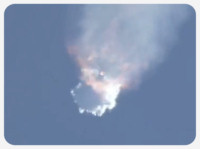 After so many successful launches, it was particularly sad to see a SpaceX rocket blow up. That is what unfortunately happened yesterday about two and a half minutes after the Falcon 9 with the Dragon transporter on board had initially launched successfully, but shortly before the first stage separation something went catastrophically wrong and the rocket exploded in a huge cloud of smoke. This would have been the eighth successful launch of a Dragon transporter to the International Space Station by SpaceX and a complete failure is what nobody had really expected at this point. The video of the launch is actually hard to watch because it seemed like a picture-perfect liftoff in the beginning.
After so many successful launches, it was particularly sad to see a SpaceX rocket blow up. That is what unfortunately happened yesterday about two and a half minutes after the Falcon 9 with the Dragon transporter on board had initially launched successfully, but shortly before the first stage separation something went catastrophically wrong and the rocket exploded in a huge cloud of smoke. This would have been the eighth successful launch of a Dragon transporter to the International Space Station by SpaceX and a complete failure is what nobody had really expected at this point. The video of the launch is actually hard to watch because it seemed like a picture-perfect liftoff in the beginning.
But spaceflight is extremely hard to do and accidents like this should be a reminder that nothing is one hundred percent guaranteed, even with a company that has such a good success record like SpaceX. Not much is yet known about the cause of the accident, but Elon Musk has mentioned on his Twitter account that it probably had something to do with an upper stage oxygen tank overpressure and the video availbale at the moment actually looks like the upper stage disintegrated first while the first stage was still running. This is actually good news, because it does not seem to have been an engine problem of SpaceX’s very reliable own Merlin rocket motors. Still, Rockets are unpredictable, volatile and notoriously dangerous and even with a company as cautious as SpaceX, things can go wrong. It has nothing to do with negligence or inexperience – what we’re seeing here is the active development of spaceflight in which unfortunate accidents with unforseeable causes sometimes happen.
There is no doubt that this is a big problem for NASA and the ISS, because the Dragon capsule had a lot of important freight on board. Among the hardware going up was the first of two International Docking Adaptors, which will unfortunately make the scheduled expansion of the station more difficult now. There was also a replacement space suit on board and the Meteor Composition Determination experiment, which had already been destroyed once before with the loss of the Orbital Sciences Cygnus launch failure last fall. Apart from the crew provisions, a lot more science was also lost, among it thirty student experiments, which is especially sad. Also lost were eight earth-observing CubeSats for the Flock-1 constellation.
All of this is more or less replaceable and the space station’s occupants are not going to run out of provisions at least until the end of the year, but since this is now the third loss of a cargo flight to the ISS in less than a year after the loss of the Cygnus in October and the Progress in May, the pressure has definitively risen and if there is one more launch failure, things will get dicey on the ISS. The next launch is already on Friday with a Progress from Russia, followed by the Japanese HTV on August 16. Another Progress launch is scheduled for November and Orbital Sciences will send up its Cygnus transporter on an Atlas V rocket from ULA, replacing their own troubled Antares, in December. Space X had two more launches this year scheduled for September and December, but the company has mentioned that it has to ground the Falcon-9 for several months, although not until the end of the year. It’s safe to say that the launch schedules to the ISS for both uncrewed and crewed flights is now completely out of sorts and will go through many changes in the next few months.
2014 and 2015 have not been really good years for space exploration, but SpaceX will find out what went wrong and recover from it. It is particularly unfortunate that several setbacks have happened in a short timespan after each other, but this is by far not the end of human spaceflight like some will undoubtedly call it. On a more personal note, it was also Elon Musk’s birthday yesterday and having to watch the rocket your company built explode is not a good way to celebrate – but if there is one company capable of getting through such a crisis, it is SpaceX!